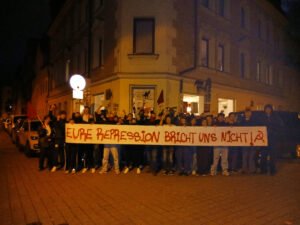In Nuremberg recently, on October 11, there were several simultaneous house searches against antifascists. In total, the homes of six people were searched and all kinds of technical equipment such as cell phones or data carriers and documents, on which the cops suspected relevant informations , were confiscated. Now the antifascists are confronted with §129 investigation process. The reason, however, are not serious crimes, but the spraying of political slogans.
These measures were ordered by the Munich General Prosecutor's Office, with the approval of the Munich District Court. The units that carried out the search measures were units of the so-called "Supporting Command (USK)", a special unit of the Bavarian police, which also has a major focus on combating protests.
The accusation made by the Prosecutor General's Office is the "formation of a criminal organization" according to §129. Therefore, a corresponding investigation has now also been initiated against the anti-fascists. In principle, 129 investigations actually involve the alleged commission of the most serious criminal offenses. However, these are usually simply constructed by the reaction, in a political will to persecute without clear evidence. In the current situation in Nuremberg, however, the peculiarity is that the public prosecutor's office here does not even bother to pull any circumstantial evidence for such a most serious crime from its fingers. Thus the criminal offences, with which the searches and the preliminary proceedings are justified, are only the writing of political slogans on several walls. With the painted slogans, the antifascists are said to have expressed their opinion on the so-called Antifa-East-trial.
Six simultaneous searches and an initiated 129th investigation because of the spraying of slogans are downright absurd, if one looks at how many graffiti everywhere characterize the picture of every larger German city. The reason for these repressive measures is quite obviously the political will of the German class justice to persecute anti-fascists.
Such an approach clearly fits into the tendency that has emerged in recent years in the handling of the 129th paragraph by the repressive authorities. Thus, the paragraph 129 is increasingly used as an instrument of persecution against all those forces, that stand in the way of the interests of German imperialism in any way. A very well-known example is the already mentioned Antifa-East-Trial, in which several anti-fascists, because of their determined fight against fascists, were sentenced to years in prison. But even pacifist forces, such as the Last Generation, whose supposed "resistance" consists exclusively of non-violent actions, now also face 129 investigations.
For the German repressive authorities, §129 is a useful tool in the prosecution of political resistance. Persons who are allegedly part of a so-called "criminal organization" can be sentenced to up to five years' imprisonment for membership of that organization in addition to the crimes of which they are accused. In addition, not only the membership but also the support or the advertising for supporters is punishable. How exactly this "support" looks is not defined in more detail. In the known arbitrariness of the repressive authorities, however, anyone who in any way helps those who are persecuted under Section 129, or even just publicly shows solidarity with them, can be sentenced for it.
A key point here is that, even if the case is close without any result, a ongoing129 procedure allows a whole range of spying measures, which (at least officially) have not been allowed before. Such measures would be, for example, intercept apartments or secretly monitoring chat histories. In the anti-fascist movement, Paragraph 129 is therefore often referred to as the so-called spying paragraph.
The actions of the class justice in Nuremberg are developments that show a clear effort of the German state to cover resistance with more and more severe repression. This is an expression of the increasing general tendency of the reactionarization of the state, which at the current time is also particularly evident in the repression against pro-Palestinian protests. Throughout history, the ruling classes have tried to break resistance to injustice with repression. In the long run, however, this has never succeeded. This time either, the ruling classes will not succeed.











